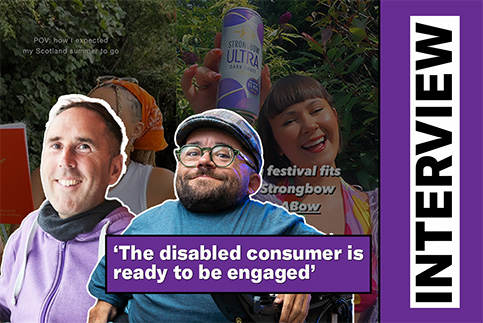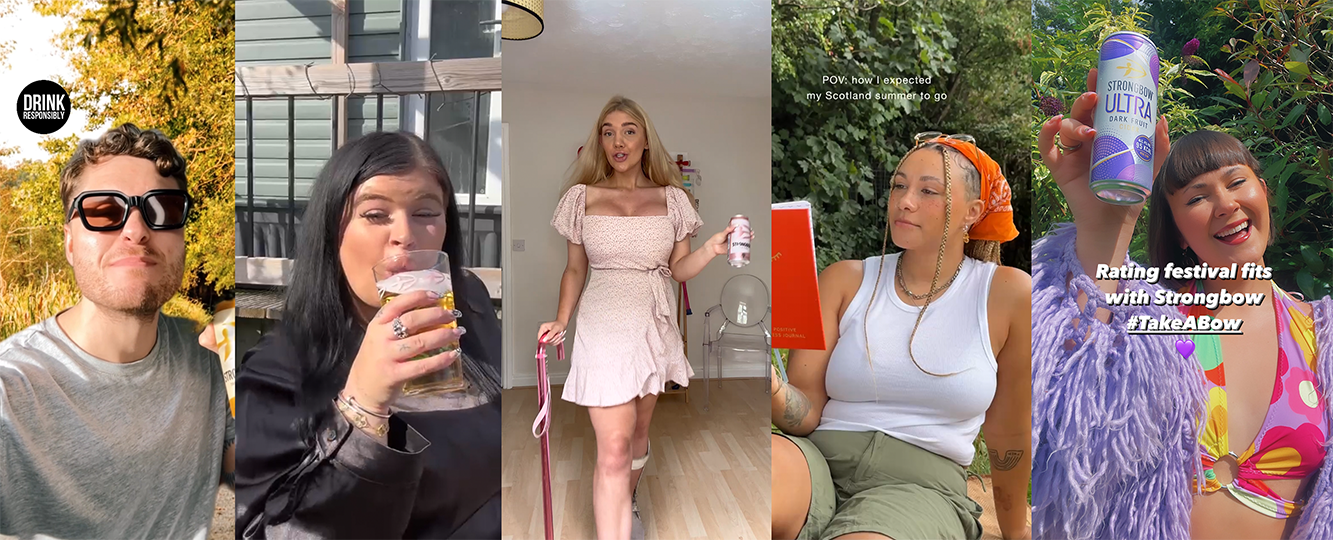Purple Goat at 5: ‘Inclusion isn’t difficult when you have the right voices in the room’

The Media Leader Interview
The disability and inclusion marketing agency’s Martyn Sibley and Dom Hyams discuss lessons from their first five years, the business case for disability representation and why inclusivity shouldn’t take a backseat in media investment.
“We know the more comfortable, confident, educated individuals and brands are, the more naturally inclusive decisions they make.”
Celebrating the five-year anniversary of Purple Goat, founder and CEO Martyn Sibley (pictured, left) and global client director Dom Hyams (right) look back proudly on how the agency has grown.
“The reality is, inclusion isn’t difficult when you have the right voices in the room,” Hyams tells The Media Leader. “Us integrating ourselves in a way where we can demonstrate that at scale is really the name of the game.”
The specialist disability and inclusion agency was founded in 2020 by Sibley with the goal of addressing gaps in representation for disabled people in ads and at the brands and agencies that produce, buy and sell them.
For the first few months, he operated as a one-man band before eventually partnering influencer marketing shop Goat (now part of WPP) to develop the agency as a sub-brand. Hyams joined as head of strategy a year later and took on his current role last year.
As the agency has grown in size, so it has in scope. While Purple Goat specialises in influencer marketing like Goat, it has increasingly moved into consulting and insight to bring the voice of the broader disability community to brands looking to ensure they are building inclusive media and creative strategies.
The business opportunity for nailing such messaging is substantial. While the World Health Organization estimates that 16% of the global population experiences a significant disability, just 1% of ads feature disabled people.
Continued engagement amid muted Pride
2025 has been a troubling year to pitch the idea that inclusivity should be a top consideration among brand marketers.
Pride Month was muted in June amid a conservative-led culture shift in Western countries following the election of US president Donald Trump, while Disability Pride Month has been similarly affected, according to Hyams.
He tells The Media Leader that there has “definitely” been a move away from conversations around inclusivity this year.
“Anecdotally, we’re seeing creators talking about how they’re doing less work around Pride,” he admits. “Disability Pride [Month] is not as powerful a conversation as it has been previously.”
The key, according to Hyams, is that while brands haven’t been as loud about supporting disability inclusion, the work has continued on anyway.
“If you’re decoupling disability from the conversation around inclusivity, then a lot is still happening,” he explains. “Because when it comes to creating something that’s accessible for all, that’s something a lot of brands want to do and are needing to do on the ground.”
From celebration to silence: the great Pride disappearing act
That hasn’t stopped Sibley and Hyams from “preaching the gospel” during the month of July, much in the same way that the Paralympic Games offers an opportunity for heightened visibility every four years.
This month, the team at Purple Goat has sought to teach the wider industry about the importance of moving from “tokenism to true inclusion” and engage with the disabled community “for the rest of the year, not just in July”, Sibley points out.
“It’s good to have engagement, it’s good to have awareness — but actually the proof is in the pudding of the hard graft of Purple Goat and of brands doing this work every day of the year,” he says.
Hesitancy to embrace lower-funnel options
While Purple Goat’s leaders are confident that they have proven the brand marketing argument in favour of inclusive representation, Sibley admits there is still a need for “more hard and fast data” around lower-funnel impact.
“Higher up the funnel, it’s so easy to track all the great benefits of impressions and engagement and sentiment,” he observes.
“The journey our clients are on with us is how we, more and more, can work closer so that in the end there are maybe particular offerings for disabled customers, as one example, or really targeted marketing campaigns where you can get into the nitty-gritty of sales.”
Yet brands have been hesitant to move down the funnel by directly targeting disabled customers and measuring sales impact. In Hyams’ view, brands don’t want to be seen as “self-serving” by talking about success in such performance marketing efforts.
“We’re trying to get them to understand that the disabled consumer is ripe, ready and wanting to be engaged,” Hyams says.
Sibley acknowledges that brands need time to understand how moving down the funnel with disabled customers need not be risky.
“It’s to do with the narratives of disabilities,” he argues. “Historically, it was a very medical conversation and it was a charity conversation. And so what disabled people are all saying is: we’re citizens, we’re consumers — please treat us like that.
“There’s still this hangover that brands are worried they’re going to come across wrong because they’re almost still feeling like they should be treating disabled people under a charity model, which is not what disabled people want.”
Despite the slower progress in boasting performance marketing success, Sibley points to Purple Goat’s continued award wins as a signal that investing in reaching the disabled community isn’t just a “flash in the pan” but has real staying power and commercial impact.
The agency won a Grand Prix and Silver Lion at this year’s Cannes Lions for its work with Channel 4 and Bupa, respectively.
‘Always room to learn’: Reactions to Channel 4’s accessibility target
Diversity in creator economy is ‘good business sense’
Influencer marketing is playing an increasingly large part in the media mix and Sibley suggests there is an “abundance of disabled content creators” for brands to choose from, all with their own demographics and intersectional audiences.
“This is about people that already have community; they’re making their own media,” he stresses.
The global influencer marketing industry was worth an estimated $24bn in 2024, with some analysts expecting this figure to double by 2028. According to WPP Media, user-generated content will account for a greater share of ad revenue than professional content this year, with platforms like TikTok, YouTube, Kuaishou and Instagram the largest beneficiaries.
Purple Goat is increasingly leveraging its relationship with leading creators not just for campaigns but also its consultative work with brands wanting to understand their experience on behalf of the disabled community.

“Influencer, very broadly, is very firmly moving into a place where it can be a lot of things: performance marketing, PR, brand content,” Hyams adds. “Brands that are able to identify the different places and spaces that it can work for them — they’re reaping the rewards of that.”
Importantly for Purple Goat, brands are growing their understanding of the disabled creator community, tapping it for more than just simply talking about disability-related topics. The progress is noteworthy, exemplifying the normalisation of disabled representation in influencer advertising.
“Having a strong diversity of creators in their campaigns is just good business sense now,” says Hyams. Sibley adds that consumers enjoy shopping with brands that “care about people”, noting that “brand sentiment means a lot”.
Yet disability representation remains under-indexed across the whole media ecosystem. And so, five years on, Purple Goat’s mission remains to close the gap.
So what about the next five years? Sibley says: “You basically want a disability offering to be part of a broader industry. That’s also inclusion. But then there is still that need to have a grounding in disabled people driving it and helping design and create it.
“We want to be more and more part of the marketing industry, but without diluting or losing the ‘by the community, for the community’ side.”
News, analysis, comment and community — Join The Media Leader
This article has been updated following publication. An earlier version of this article incorrectly stated Purple Goat won an award at Cannes Lions this year for its work with Tui, for which it has won other awards for.




